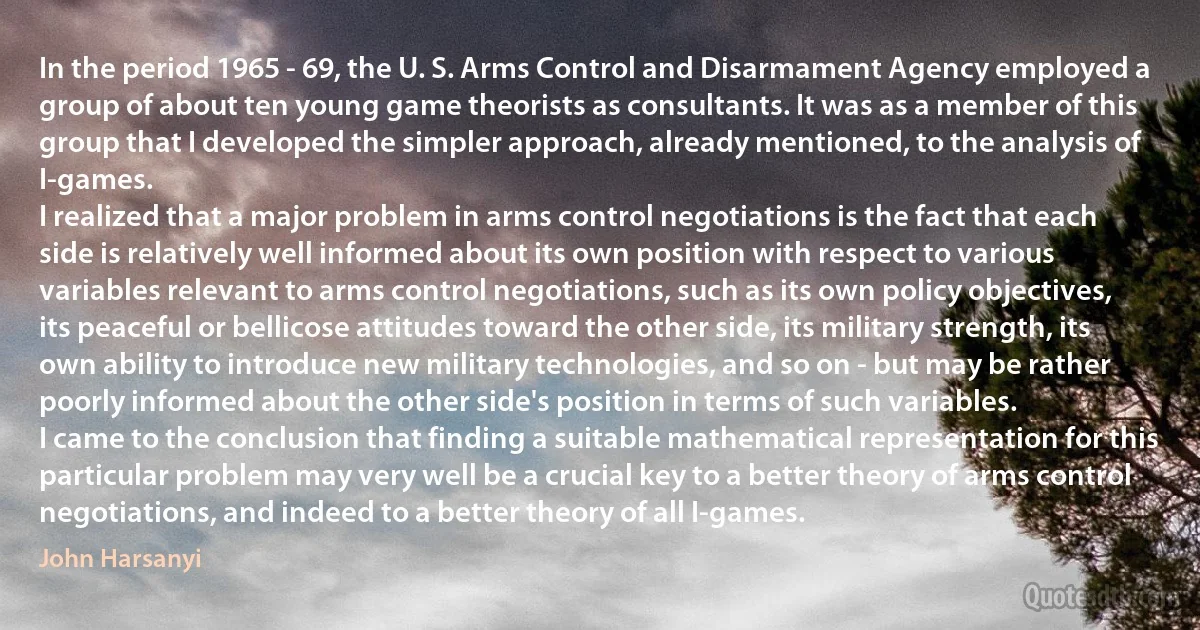
In the period 1965 - 69, the U. S. Arms Control and Disarmament Agency employed a group of about ten young game theorists as consultants. It was as a member of this group that I developed the simpler approach, already mentioned, to the analysis of I-games. I realized that a major problem in arms control negotiations is the fact that each side is relatively well informed about its own position with respect to various variables relevant to arms control negotiations, such as its own policy objectives, its peaceful or bellicose attitudes toward the other side, its military strength, its own ability to introduce new military technologies, and so on - but may be rather poorly informed about the other side's position in terms of such variables. I came to the conclusion that finding a suitable mathematical representation for this particular problem may very well be a crucial key to a better theory of arms control negotiations, and indeed to a better theory of all I-games.
John HarsanyiRelated topics
ability approach arms came control disarmament game key position problem representation respect side simpler strength ten well youngRelated quotes
I would summarize the Keynesian view in terms of four points:1. Economies sometimes produce much less than they could, and employ many fewer workers than they should, because there just isn't enough spending. Such episodes can happen for a variety of reasons; the question is how to respond.
2. There are normally forces that tend to push the economy back toward full employment. But they work slowly; a hands-off policy toward depressed economies means accepting a long, unnecessary period of pain.
3. It is often possible to drastically shorten this period of pain and greatly reduce the human and financial losses by "printing money”, using the central bank's power of currency creation to push interest rates down.
4. Sometimes, however, monetary policy loses its effectiveness, especially when rates are close to zero. In that case temporary deficit spending can provide a useful boost. And conversely, fiscal austerity in a depressed economy imposes large economic losses.

Paul Krugman
With respect to the homosocial/homosexual style, it seems to be possible to divide Victorian men among three rough categories according to class. The first includes aristocratic men and small groups of their friends and dependents, including bohemians and prostitutes; for these people, by 1865, a distinct homosexual role and culture seem already to have been in existence in England... It seems to have constituted a genuine subculture, facilitated in the face of an ideologically hostile dominant culture by money, privilege, internationalism, and for the most part, the ability to command secrecy... This role is closely related to - is in fact, through Oscar Wilde, the antecedent of - the particular stereotype that at least until recently has characterized American middle-class gay homosexuality; its strongest associations, as we have noted, are with effeminacy, transvestism, promiscuity, prostitution, continental European culture, and the arts.

Eve Kosofsky Sedgwick
Physical science comes nearest to that complete system of exact knowledge which all sciences have before them as an ideal. Some fall far short of it. The physicist who inveighs against the lack of coherence and the indefiniteness of theological theories, will probably speak not much less harshly of the theories of biology and psychology. They also fail to come up to his standard of methodology. On the other side of him stands an even superior being - the pure mathematician - who has no high opinion of the methods of deduction used in physics, and does not hide his disapproval of the laxity of what is accepted as proof in physical science. And yet somehow knowledge grows in all these branches. Wherever a way opens we are impelled to seek by the only methods that can be devised for that particular opening, not over-rating the security of our finding, but conscious that in this activity of mind we are obeying the light that is in our nature.

Arthur Eddington
We are... bound to attach the greatest importance to the preliminary step taken by Lavoisier, who is even more justly called the father of modern chemistry than Kepler is called the father of modern astronomy. The exact claims of Lavoisier to this important place in the history of chemistry have been variously stated: ...since his time, and greatly through his labours, the quantitative method has been established as the ultimate test of chemical facts; the principle of this method being the rule that in all changes of combination and reaction, the total weight of the various ingredients-be they elementary bodies or compounds-remains unchanged. The science of chemistry was thus established upon an exact, a mathematical basis. By means of this method Lavoisier, utilising and analysing the results gained by himself and others before him, notably those of Priestley, Cavendish, and Black, succeeded in destroying the older theory of combustion, the so-called phlogistic theory.

Antoine Lavoisier
Hayek sees that the zero-sum vision is fired by an implacable negative energy. It is not the concrete vision of some real alternative that animates the socialist critic of the capitalist order. It is hostility toward the actual, and in particular toward those who enjoy advantages within it. Hence the belief in equality remains vague and undefined, except negatively. For it is essentially a weapon against the existing order – a way of undermining its claims to legitimacy, by discovering a victim for every form of success. The striving for equality is, in other words, based in ressentiment in Nietzsche's sense, the state of mind that Max Scheler identified as the principal motive behind the socialist orthodoxy of his day. It is one of the major problems of modern politics, which no classical liberal could possibly solve, how to govern a society in which resentment has acquired the kind of privileged social, intellectual, and political position that we witness today.

Roger Scruton
